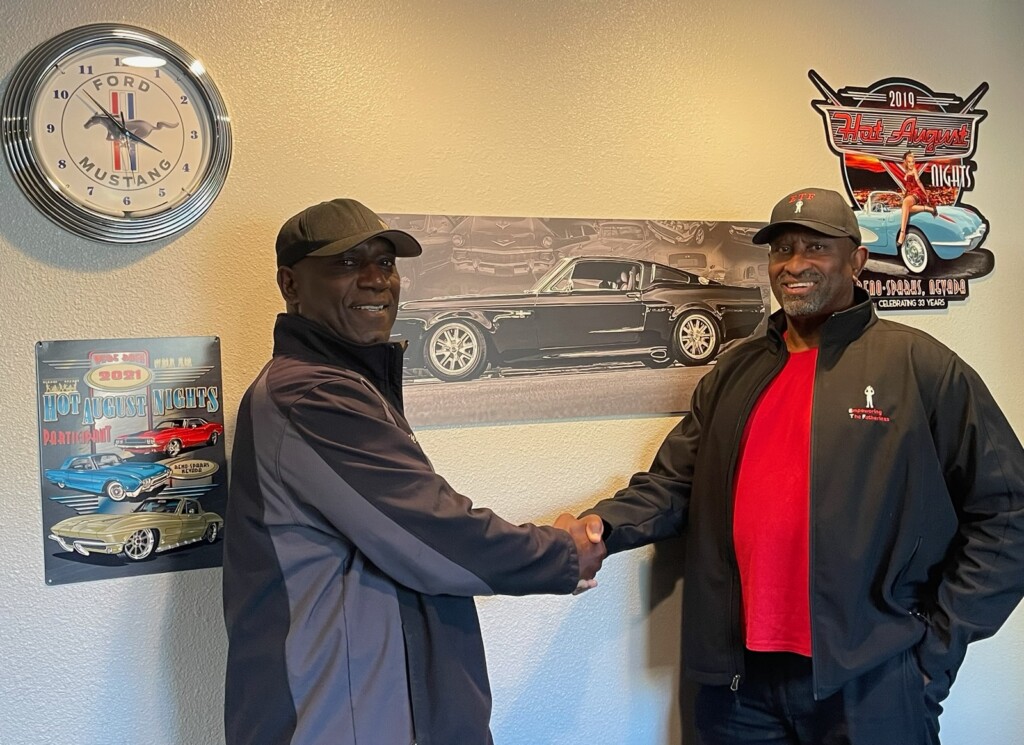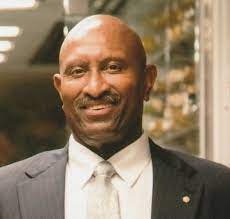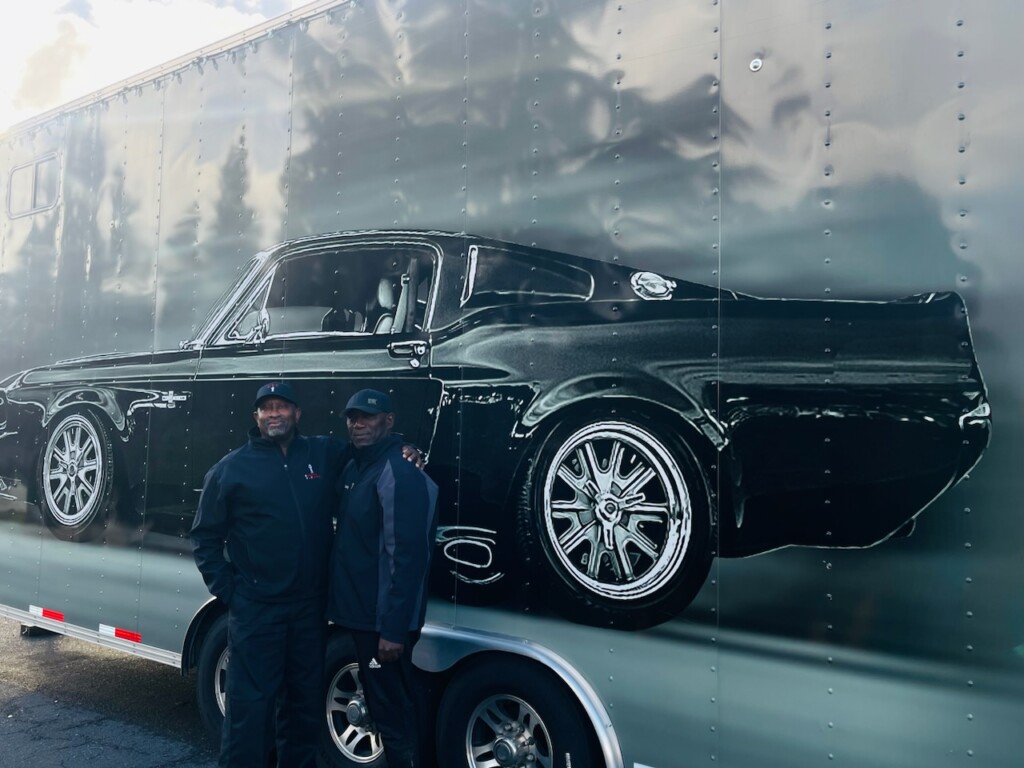Community Voices … with Terrance Hunter: African-American business people play role in Black history
Let’s continue the tradition of the Black business men and women who built Tulsa’s Greenwood district.
![]()

Les Stuart, owner and founder of Big Daddy’s Motor Cars at left, with Terrance Hunter, founder of the nonprofit Empowering the Fatherless. Photo courtesy Terrance Hunter
By Terrance Hunter

Terrance Hunter
At the turn of the 20th century, African Americans founded and developed the Greenwood district in Tulsa, Oklahoma. The community grew and flourished as an African-American economic and cultural mecca. Thousands of African American Tulsa residents had established a self-sustaining community that supported hundreds of African American-owned businesses. It was known as “Black Wall Street.”
This modern and sophisticated African-American community consisted of 35 square blocks that included banks, hotels, cafés, clothiers, movie theaters, and contemporary homes. Residents enjoyed luxuries, such as indoor plumbing and a remarkable school system that educated African-American children. During Black History Month, I find myself contemplating the leaps and bounds that could have been achieved had this community not been massacred and burned to the ground by white supremacists in 1921 during a racial riot. The number of people murdered is estimated at 300.
The history of African American’s contributions to this country that highlighted the Industrial Revolution has been largely muted. The birth of major improvements in agriculture, transportation, communications, manufacturing, and electricity that stimulated rapid economic growth, took place during this period. Except for a few notable African-American inventors, who are regularly elevated during Black History Month — such as George Washington Carver (for peanut products) and Madam C. J. Walker (for hair products) — many other African-American innovators have been strongly ignored.
Though Black History Month is a time to celebrate historical figures of the past, I believe it is also an opportunity to acknowledge African Americans who are currently striving to make contributions that benefit our society, today. I would like to take this opportunity to give recognition to my dear friend, mentor and business associate, Les Stuart, who resides in Morgan Hill.
Les’s parents were born in the Caribbean. Their homes lacked refrigeration and they had only one pair of shoes. Family, respect, and education were extremely important in both families. Les’ father’s family and his mother’s family immigrated to the U.S. in the 1950s. They came in through Ellis Island in New York, settled in Brooklyn and Long Island, married, and were naturalized.
 His father drove a taxi and put his mother through nursing school. Les’s mother became a nurse and she then put Les’ father through college and medical school, while he was enrolled in ROTC. Les’ father enlisted in the U.S. Army, where he completed his internship and residency. He later opened his private practice in San Jose. As one of two Black pediatricians in the Bay Area, his practice drew patients from all across the Bay Area.
His father drove a taxi and put his mother through nursing school. Les’s mother became a nurse and she then put Les’ father through college and medical school, while he was enrolled in ROTC. Les’ father enlisted in the U.S. Army, where he completed his internship and residency. He later opened his private practice in San Jose. As one of two Black pediatricians in the Bay Area, his practice drew patients from all across the Bay Area.
Honor and patriotism run deep. Les is a former member of the 82nd Airborne Division, which is an active airborne infantry division of the U.S. Army. Les is a combat veteran through his unit’s participation in Urgent Fury and the U.S. invasion of Grenada.
Les is also a 28-year veteran of the high-tech industry. He worked in engineering, business development, product line management, and an executive in the management divisions of several Fortune 500 companies. He holds four patents, authored five papers, and has lectured across the globe. Les retired seven years ago.
Les has been wrenching on classic Ford muscle cars and British cars for 49 years. Following his passion, Les is now the owner of Big Daddy’s Motor Cars (BDMC), a Morgan Hill company focusing on custom building 1964/65 — 1970 Mustangs. The company has risen to global recognition. It has customers across the nation as well as internationally.
 The design of Les’ complete car builds is unique and has been dubbed “Big Daddy style.” This has produced head-turning, jaw dropping reactions as well as numerous show wins when a Big Daddy custom-built car shows up. His 1967 Pit Viper is proof of this with 47 wins in three years, many Best of Show and Best in Class awards, voted Best Mustang in the West for 2016, and was selected as car #0001 and the poster vehicle for Hot August Nights.
The design of Les’ complete car builds is unique and has been dubbed “Big Daddy style.” This has produced head-turning, jaw dropping reactions as well as numerous show wins when a Big Daddy custom-built car shows up. His 1967 Pit Viper is proof of this with 47 wins in three years, many Best of Show and Best in Class awards, voted Best Mustang in the West for 2016, and was selected as car #0001 and the poster vehicle for Hot August Nights.
Big Daddy’s Motor Cars is home to “The Future Gearheads Internship & Apprentice Program” for youths and adults. Les believes in “paying it forward.” By investing in the future of others and the automotive industry, we can contribute to the growth and success of the industry, change lives, and make an economic impact.
In collaboration with my nonprofit Empowering the Fatherless, our goal is to provide custom car building skills to others needing help or a second chance. Right now, we are looking at youth serving time at William F. James Boys Ranch as ideal candidates.
I predict The Future Gearheads Internship & Apprentice Program will be a very successful endeavor. Perhaps in the future, my dear friend, mentor, and business associate, Les Stuart, will be honored as an African American who transformed lives, families, and communities. He continues the tradition of the Black business men and women who built Tulsa’s Greenwood district.
Terrance Hunter is the founder of Empowering the Fatherless. Learn more by going to www.empoweringthefatherless.org
